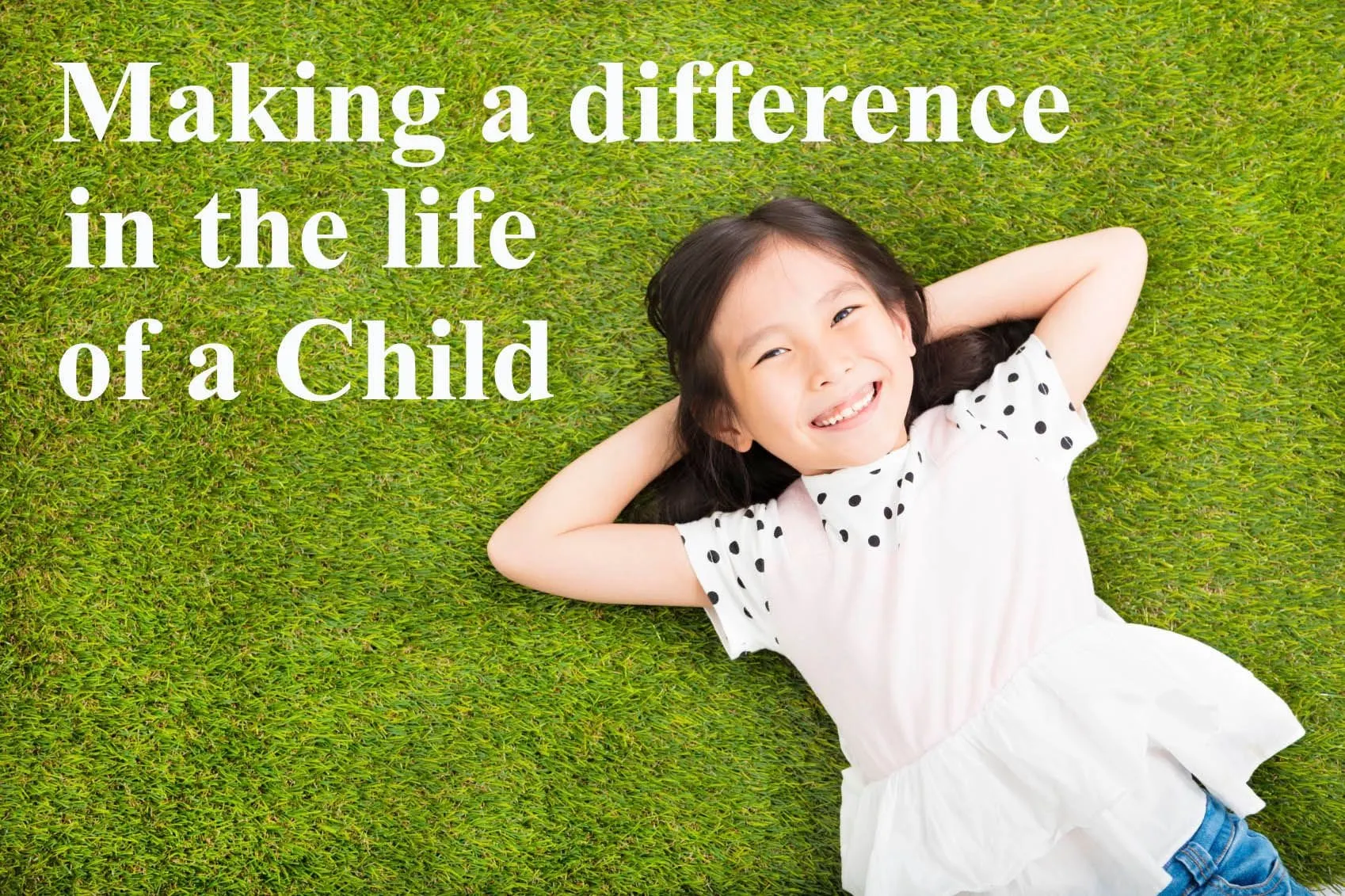
Making a difference in the Life of a Child
Learning to Listen
We as parents have so much to teach and tell our children. We just want to pour all we know and have learned into them to help save them from some of the painful experiences we had. Unfortunately, in our zeal to tell and teach we fail to create the space from which they can hear our wisdom. In our enthusiasm to tell them what we think on the subject we fail to listen to what they are expressing about their unique experience.
Speaking as a parent and a therapist I have, on more than one occasion, told a young person something before I set the great example of listening to their view. The result was that the child did not connect with me and tell me more of their pain. They shut me out keeping themselves isolated and unavailable for wise counsel in how to bring about a change in their experience.
I do not like the feeling of not being connected to another individual. I do believe that is all we want from one another, to be heard and validated. I believe we want this and, even more, need this from every significant relationship we have. It does not matter if we are in a relationship with our life partner, our children, our parents, our co-workers, our supervisors, our former life partners, our neighbors or our friends. We all just want to be heard. We want to be seen. We want to matter to someone else. Brain research informs us that from the moment we are born there is a hook in our brain that is scanning for the caring adult brain we can connect with. This drive to connect with another brain does not go away until the moment we transition off the earthly plane.
While here, each of us wants to express our views in a relationship with a caring other. Research has found that it only takes one caring adult to make a difference in the life of a child. Just one caring other can impact the life of a child. And all too often, children cannot find that one caring person. Just reflect on your own childhood, who was the person who made a difference for you?
This article is being written for those of you who want to be that one in the life of a child. These tools and principles apply to teachers, social workers, probation officers, counselors as well as parents. As parents, it does not matter if that child joined you as a foster child, birth child, adopted child or neighbor’s child, you can make a difference in their life.
There are three things I have seen make a difference in the power of our listening to another. One, you have to show up and be present. Two, you have to have a willingness to totally take in what the other is saying. And third, you have to be willing to put your perspective aside to create space to hear the other with your whole body. Not to worry, I will explain what I mean by each of these.
The first thing we have to do is show up and be totally present in the moment. This means, the business meeting, the grocery shopping, the other thing that is waiting to be done, must be totally put out of our minds so that there are no other concerns or issues vying for our attention in this moment.
In this moment, the fact that dinner is waiting to be cooked because the entire family is hungry, must be an aside issue. The stove must be turned off, and our total attention must be ready to focus on the child who is asking for us to notice them. So often, I have heard parents say, “I don’t know why he says I don’t listen.” When I ask the child, they can recall to the last detail what the parent was doing every time they tried to get their parent’s attention to tell them something important.
The fact that you are working on papers from work, looks to the child like the papers are more important than they are. The fact that you respond with, uh huh and yeah, sounds to the child like your attention is on something you perceive as being more important than them. Our children want us to drop whatever we are doing and focus all of our attention on what they have to say in that moment.
Now of course, you are the parent and you are in charge. If what you are doing, in fact cannot be placed on the back burner, then say so. “Johnny, I would love to listen to what you have to say. And I am sure you want me to hear all of what you have to say, don’t you? Well, in order for me to do that, I need to wait for … (however long) and then I will be able to focus all of my attention on what you have to tell me.” Just be sure you follow through and make yourself available in the time you stated.
The next step is to have a willingness to totally take in what the child has to say. So, after you have cleared your mind of all possible distractions, make sure you give your child both sides of your brain. If emotionally you do not care what is going on in their world, for whatever reason, you are not going to be able to fake totally listening to them. The right brain is a non-verbal brain.
Dr. Allan Schore, the neuroscientist, who specializes in emotional regulation, tells us that there are 40,000 pieces of information that are communicated from one right brain to another right brain. To me this means I better be emotionally present when I sit down to listen to a child, because if I am not, they will know it. This is key and critical.
In my experience, right brain communication is what makes the difference in a child feeling heard and validated. If you can totally take in what they are saying and let it run through you before you respond, if you respond at all, the child feels like they have made an authentic connection with a caring other. They feel seen and heard by another human being. They feel cared about.
The third and last thing to focus on, is releasing any judgment or preconceived idea of what is being shared. You will unwittingly communicate your disapproval through right brain communication, so the most important thing is to suspend your evaluation. Often times, if given the chance, our children surprise us with how they are able to incorporate the values and lessons we have attempted to teach them up until that point. If we listen, and give them a chance to work their way through the thoughts and feelings behind the experience, they may surprise you and end up at the point you would have taken them anyway.
Fear of judgment and of what we will say and think about them, often times, is what keeps them from telling us what is going on in their world in the first place. They care so much about what we think of them. They want to please us. Sometimes though, some of our more damaged children do not know how to go about doing this.
As the child talks during this time, we can ask questions that might guide them to think about certain things. For instance, “How did it make you feel when Susie said she would play with you if you gave her your dessert?” “What did you think of yourself after hitting Jose for taking your pencil?” Just be sure the questions you ask are not judgmental questions. This is not an attempt to get your views in from the side door. Your views are on hold.
At the end of the conversation, you can ask your child if they would like your help in solving the problem, or if they would like to know what you think. During this time, it is most critical that you go to your heart and speak from that place. The very first thing you will do if invited to respond, is to validate how difficult it must have been for them to share this news with you. Tell them how proud you are of them for coming to you with this challenge. This is a sign of maturity, and demonstrates courage to reach out and trust you.
It is an honor that this child has chosen you with whom to share their world. This is indeed an honor for each of us that are asked to come into their inner world. If you do not appreciate what an honor this is, and you abuse the privilege, do not expect to be invited in again any time soon. When they do invite you in again, be sure to show up from your heart. When you do respond keep your response to two to three sentences at the most. This is not the last conversation you will have with your child. Think about the most important point of what you want to say and get in, say it, and get out. Otherwise, we enter the Charlie Brown zone and the child will not hear us anyway.
When you put these three things together, the result is a powerful connection to another human being. If you have ever experienced this kind of connection, you know how powerful it can be. I believe that no matter what the difficulty or challenge you are facing having another to share it with who still accepts you after you tell them this horrible thing you are going through is the most healing experience any one can have.
My under 12 clients all have one incident they can point to where they told me something they thought was so devastating, they felt for sure I would not like them after hearing it. I can see it in their eyes as they are telling me. They constantly scan waiting for the time when I judge them and think less of them as a part of listening to what they are telling me. When I respond from a place of understanding, there is an energetic shift that the parents sitting in the room can see and feel. It is as if the child lets down one of their guards, or shields, that have been in place to prevent the adults from getting close to them. Often times, the child unconsciously puts this shield in place to protect themselves from the pain of disappointing us.
© Attachment Healing Center
